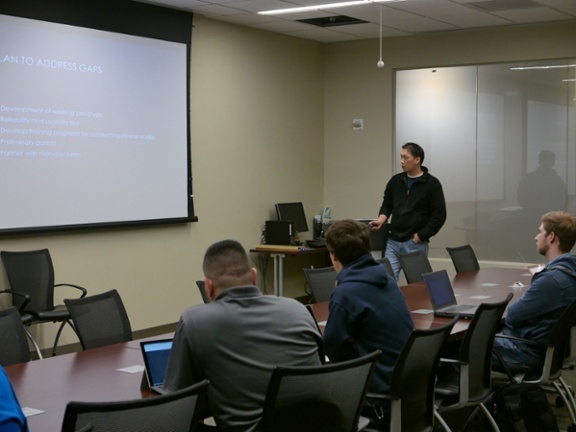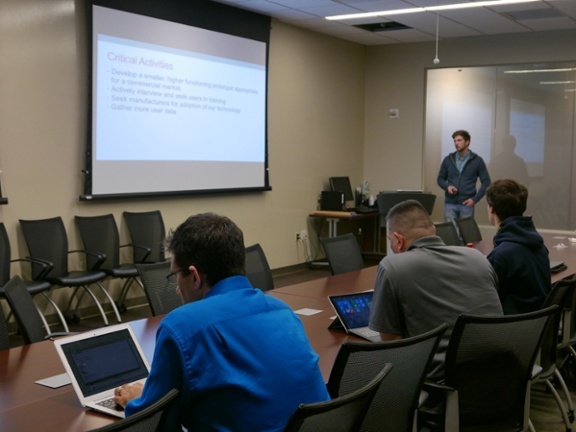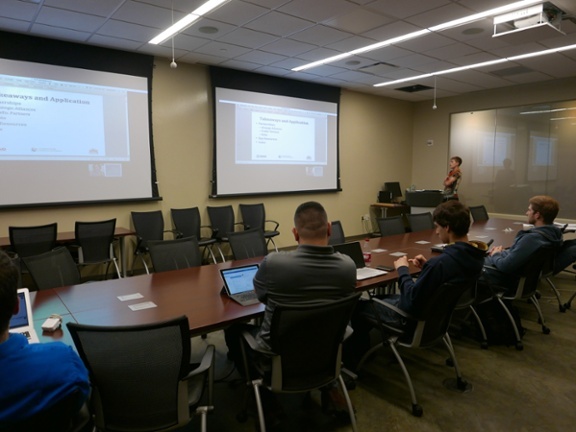When it comes to developing innovations that allow people with disabilities to lead more independent and fulfilling lives, it's hard to match the Human Engineering Research Laboratories (HERL). Nine teams from HERL developed a go-to-market plan for their innovation throughout the six sessions of the Innovation Institute's Pitt Ventures First Gear program.
This was the second time that HERL's Director, Dr. Rory Cooper invited the Innovation Institute to host Pitt Venture's First Gear program, helping his faculty, staff and students assess the market potential for their innovations. HERL’s mission is “to continuously improve the mobility and function of people with disabilities through advanced engineering in clinical research and medical rehabilitation,” which aligns well with the Pitt Ventures goal of creating commercialization plans that can deliver these innovations to society.

Dr. Cooper said, “We had a successful program last year. The students and faculty learned quite a bit, and it resulted in improvements in how members of the HERL team looked at our R&D efforts. I have seen a similar transformation this year, especially among the students participating.”
The program culminated with a judged pitch competition on April 8 that provided additional funding for a 1st place recipient, the Manual Virtual Seating Coach team, and a 2nd place recipient, the VIP Wheelchair team.
First Gear is part of the NSF I-Corps Site program, through which each team is initially awarded $3,000 towards commercialization. Consistent with the requirements of the I-Corps national program, the teams consist of academic leads (AL), entrepreneurial leads (EL) and a business mentor (M) who work together to understand their customer, the market and the value their innovation provides for customers and investors. Read about each innovation below!
1. Manual Wheelchair Virtual Seating Coach (MVSC)
AL – Dr. Rory Cooper EL – S. Andrea Sundaram M – David Algood
Pressure sores result from individuals sitting in wheelchairs not performing frequent enough weight shifts due to reduced or absent nerve sensation. The resulting ulcers are a significant health concern with negative effects on quality of life and expensive treatments. While the HERL team previously developed a tool to assist those in motorized wheelchairs, until now a solution for those in manual wheelchairs was not available. The MVSC is an important tool for pressure relief reminders because it monitors the user’s behavior to provide alerts only when they are needed. It also helps build and reinforce positive behaviors, tracking progress over time.
Andrea Sundaram said that meetings with his mentor, David Algood, were an important part of the First Gear program. “We discussed a few different production and distribution models that would be open for the MVSC, and detailed the steps needed beyond technology development.” Algood also helped with pitches, advising Sundaram to focus on the need and the way their product meets it rather than the technical aspects of the product. “What was most motivating was talking to clinicians outside of HERL and finding that they saw the same needs that led us to launch this research,” said Sundaram.
2. VIP Wheelchair
AL – Dan Ding EL – Hyun Ka M – Phil Brooks
The VIP Wheelchair is a control system to improve power wheelchair driving accessibility, independence and safety for people with vision and mobility impairment. The wheelchair incorporates a number of feedback and control mechanisms to help visually impaired users avoid obstacles ad drop-offs.
Imagining living with any disability is difficult, but finding the courage to actively engage with the world with blindness from the seat of a wheelchair is truly astonishing. This innovation offers the 200,000 people facing this challenge in the US real hope for a level of independence not previously available.
3. H.E.L.I.C.A.L. - High Efficiency and Reliability Digital Controller Air Manifold
AL – Dr. Rory Cooper EL – Dean Palacios M – John Riley
The High Efficiency and Reliability Digital Controller Air Manifold is a reliable valve and manifold system for pneumatic actuators in high performance applications, such as mobility enhanced wheelchairs. The innovation withstands high pressure and relief parameters, minimizing the risk of breaking down and leaving an individual stranded in his/her wheelchair. The manifold can be used in multiple applications that require valve and manifold systems. It is also electrically controlled to maximize efficiency and minimize environmental pollution.

4. KitchARM - Kitchen Assistive Robotic Manipulator
AL – Dr. Rory Cooper EL – Joshua Chung M – Phil Brooks
The KitchARM provides assistance for people with disabilities and a growing population with chronic conditions, relieving the shortage and high cost of personal care attendants. The KitchARM is a custom-designed robotic arm that attaches to a mobile or track system to increase users’ independence, productivity and quality of life by limiting the difficulty and possible accidents from lifting and placing kitchen items during daily tasks.

5. Next Health AgileLife Patient Transfer and Movement System for Power Wheelchairs
AL – Dr. Rory Cooper EL – Richard Kovacsics M – Ray Curatolo
The AgileLife Patient Transfer and Movement System is a combination bed and manual wheelchair that transfers a patient between the bed and chair without the need for the patient (or caregiver) to lift him/herself. The new technology integrates a power wheelchair into the manual wheelchair system currently available with Next Health beds to make it available to a greater segment of the mobility impaired.
6. Power Drive- A Virtual Powered Mobility Rehabilitation Platform
AL – J. Brad Dicianno/Dr. Rory Cooper EL – Deepan C. Kamaraj M – John Riley
Power Drive is a novel virtual-reality based game to assess and train individuals who need a powered mobility device. It will aid in the transition of care from the rehabilitation center to the user’s home, provide an automated clinical report with feedback for rehabilitation professionals, and enhance his/her capability for independent mobility. It has an open platform, allowing the provision for modules to be added for use in multiple environments and in future virtual reality based training programs for other uses.
7. RAOD - A Radar based Obstacle Detection System
AL – Hongwuo Wang EL – Jorge Luis Candiotti M – John Riley
When using a power wheelchair, there are many challenging situations due to obstacles, such as curbs, ramps, and hazardous environments. The RAOD is a radar-based obstacle detection system that can attach to commercial power wheelchairs and help prevent accidents through obstacle detection and avoidance.
8. ReAD - Reading Assistive Device
AL – Dr. Jon Pearlman/Dr. Mary Goldberg EL – Akhila Veerubhotla/Sara Munera/Adam Czibur M – Phil Brooks
ReAD addresses the need to increase independence and accessibility with portable reading measurement devices for people with visual impairments. It is designed to instantly read out measurement values when connected to a digital micrometer thereby providing independence, restoring confidence, decreasing error rate and helping him/her return to the workforce.

9. WIN (Wheelchair International-training Network)
AL –Dr. Jon Pearlman/Dr. Mary Goldberg EL – Rachel Gartz M – Maria Milleville
WIN is an online network that facilitates international training and mentorship among clinicians within the International Society of Wheelchair Professionals (ISWP). THere is a need to coordinate trainings, resources and guidance for trainees and trainers-in-training, standardize training and provide opportunities for continued education and user convenience.

First-time business mentor Maria Milleville said, “My objectives for the program were to strengthen my customer discovery and market analysis skills; to learn how to anticipate questions that potential investors may have about an innovation; and to provide feedback to my team without taking over the project. Working alongside an amazing team helped me accomplish those goals.” Milleville learned new skills as a mentor in the First Gear program with guidance from Innovation Institute Entrepreneur-in-Residence and fellow mentor Phil Brooks.
If you believe your research at Pitt has resulted in an innovation that can benefit society, the Innovation Institute has opportunities to help you get it to market. If you are an inventor, you can learn more about the Pitt Ventures Gear program! If you are an entrepreneur or company interested in licensing these technologies, please contact jireland@innovation.pitt.edu.